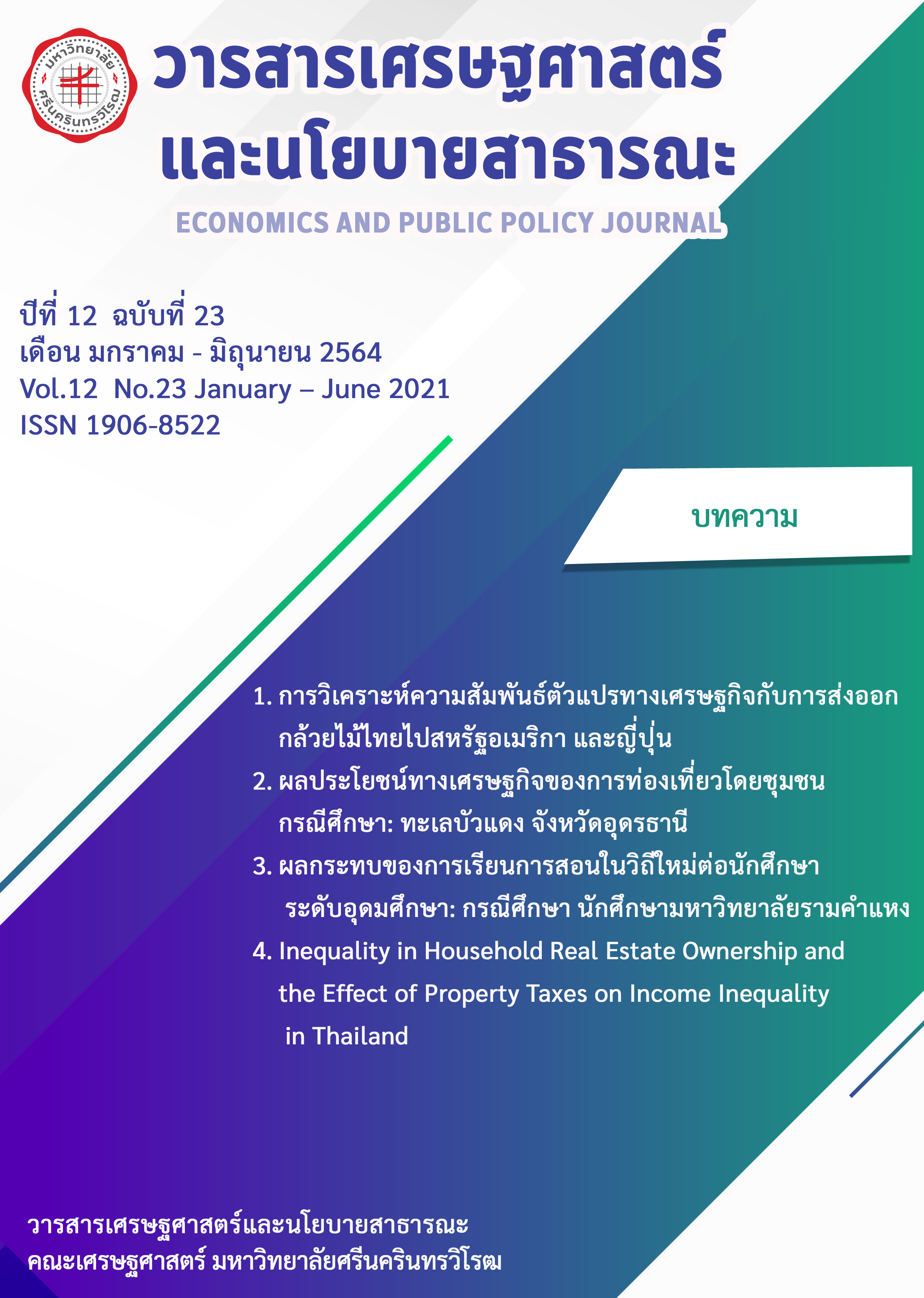The Impacts of the New Normal in Education on College Students: A Case Study of Ramkhamhaeng University’s students
Abstract
บทคัดย่อ การระบาดของโรคโควิด-19 ทำให้สถาบันการศึกษาต้องจัดการเรียนการสอนแบบออนไลน์ทั้งหมด งานวิจัยชิ้นนี้ศึกษาผลกระทบของการเรียนการสอนแบบออนไลน์ต่อผลการเรียนและความคาดหวังต่อตลาดแรงงานของนักศึกษาในระดับอุดมศึกษา โดยสนใจผลกระทบใน 10 ด้าน ได้แก่ 1) เกรดเฉลี่ย 2) จำนวนชั่วโมงเรียนต่อสัปดาห์ 3) การชะลอการสำเร็จการศึกษา 4) การถอนกระบวนวิชา 5) การเปลี่ยนคณะ 6) จำนวนชั่วโมงงานที่ทำอยู่ต่อสัปดาห์ 7) รายได้จากงานต่อสัปดาห์ 8) สมาชิกในครอบครัวว่างงาน และ/หรือ มีรายได้ที่น้อยลง 9) รายได้ขั้นต่ำที่ยอมรับได้หลังสำเร็จการศึกษา และ 10) โอกาสที่จะทำงานรับราชการ จากการสัมภาษณ์นักศึกษาระดับปริญญาตรี ณ มหาวิทยาลัยรามคำแหง จำนวน 100 คน โดยใช้แบบสอบถามที่ออกแบบมาเพื่อวิเคราะห์ผลกระทบเชิงสาเหตุ (Causal impact) ของการระบาดของโรคโควิด-19 ผลการศึกษาจากการเปรียบเทียบค่าเฉลี่ยโดยใช้ t-test พบว่า การเรียนการสอนในรูปแบบออนไลน์ทั้งหมดส่งผลกระทบต่อผลสัมฤทธิ์ทางการศึกษาและความคาดหวังต่อตลาดแรงงงานในอนาคตอย่างมีนัยสำคัญทางสถิติที่ระดับ 0.01 การเรียนการสอนแบบออนไลน์ในช่วงการระบาดของโรคโควิด-19 ทำให้ผลการเรียนเฉลี่ยของนักศึกษาลดลง 0.17 จุด ขณะที่จำนวนชั่วโมงเรียนต่อสัปดาห์ลดลง 4 ชั่วโมง นอกจากนั้น การระบาดของโรคซึ่งส่งผลให้เกิดการปิดมหาวิทยาลัยและการเรียนการสอนเปลี่ยนเป็นรูปแบบออนไลน์ยังทำให้นักศึกษาตัดสินใจชะลอการสำเร็จการศึกษา ถอนกระบวนวิชา และเปลี่ยนคณะ ขณะที่กว่า 70% ของนักศึกษาระบุว่าสมาชิกในครอบครัวว่างงานหรือมีรายได้ลดลงในช่วงที่มีการระบาดของโรคโควิด-19 นอกจากนั้น ค่าตอบแทนจากการทำงานที่ยอมรับได้หลังสำเร็จการศึกษาลดลงอย่างมีนัยสำคัญทางสถิตที่ระดับ 0.01 อีกทั้งยังทำให้นักศึกษามีความสนใจในอาชีพรับราชการเพิ่มมากขึ้นอย่างมีนัยสำคัญทางสถิติ ทั้งนี้ ผลกระทบต่อจำนวนชั่วโมงทำงานและรายได้จากงาน ไม่มีนัยสำคัญทางสถิติที่ระดับ 0.1คำสำคัญ: การเรียนการสอนแบบออนไลน์ โรคโควิด-19 นักศึกษาระดับอุดมศึกษาABSTRACT The outbreak of the COVID-19 pandemic has forced educational institution to shift to 100-percent online instruction. This study aims to investigate the effects of online instruction caused by the pandemic on academic outcomes, working, and expectation on labor market. The outcomes of interest include 1) GPA, 2) study hours, 3) delayed graduation, 4) withdrawing from classes, 5) intending to change majors, 6) working hours per week, 7) income per week, 8) family member losing income or being unemployed, 9) reservation wage, and 10) chance to work as government officer. The survey is designed to recover the causal impact of the COVID-10 pandemic among 100 undergraduate students at Ramkhamhaeng University. The findings from a t-test suggest that shifting to online instruction during the pandemic significantly impacts both students’ learning outcomes and expectations towards labor market at the 1% level. The findings indicate a 0.17-point decline in GPA and 4-hour decrease in study hours per week. The COVID-19 pandemic, with its ensuing closing of university and move to online instruction, also caused students to delay graduation, withdraw from classes, and change their majors. With respect to labor market, this outbreak significantly lowered students’ reservation wages at the 1% level. About 70% of the students who answered the survey report that their family members were unemployed or saw a decrease in income. In addition, students are more likely to work in public sector. Note that the impacts on students’ working hours and income are not statistically significant at the 10% level. Keywords: Online learning, COVID-19 pandemic, College studentDownloads
Download data is not yet available.




